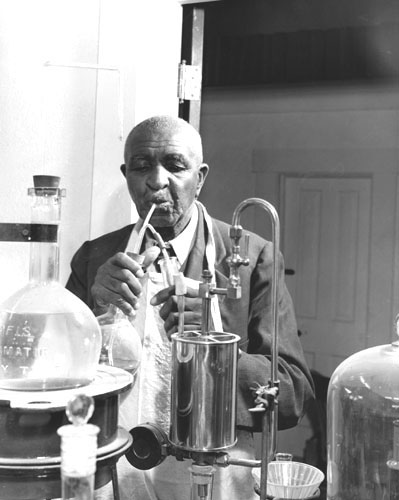Christian Encounters Series
John Perry
Thomas Nelson, 2011
vii + 161 pp
ISBN 978-1-59555-026-2
This book is one in a series of short biographies in the Christian Encounter series published by Thomas Nelson. Others include familiar subjects such as Tolkein, Bach, D L Moody, Jane Austen and Galileo; others more unfamiliar such as William F. Buckley, Anne Bradstreet and George Washington Carver.
 The two previous volumes I've reviewed were ebooks, this was a hard copy. I was pleased to see the small format and the well-designed book covers, including flaps.
The two previous volumes I've reviewed were ebooks, this was a hard copy. I was pleased to see the small format and the well-designed book covers, including flaps.Perry is well placed to write this short, accessible biography as he has previously written Unshakable Faith (Multnomah Books, 1999) - a 400 page biography of Carver and his Booker T. Washington. He has also written biographies of General Lee, Mrs Robert E. Lee, Sargent York, Charles Colson and for this Christian Encounter series Sargent York and Winston Churchill.
Carver is best known as the 'peanut man'. (He discovered over 265 uses for peanuts.) But as this biography shows he was so much more. Franklin D Roosevelt described him as “One of world’s most significant scientists”.

Carver was born into slavery as the son of a slave woman, but after his mother was kidnapped was bought up by his owner Moses Carver. Brought up in a Christian environment he soon found faith and often taught Bible at the Sunday school. He also showed great aptitude for geology and botany. Through much hardship and subsistence living he manage to work his way through school - but because of his exceptional ability soon out grew his teachers.
He found a post at Tuskegee Institute, Alabama, where he met Booker T. Washington. Washington encouraged Carver, but there was often friction and tension, despite the great mutual respect, between the two. Despite many threats to resign Carver remained at Tuskegee all his teaching years.
Carver excelled at teaching and research but administration was his shortfall. Perry presents us with Carver wart and all.
What shines through in this biography is Carter's love for and dependence upon his Lord. He credited all his 'admirable characteristics accomplishments to God' (p. 116). He believed that his scientific discoveries 'were a product of divine revelation' (p. 105). He wrote: "I didn't make these discoveries, God worked through me to reveal to his children some of his wonderful providence". Carter never let his colour hold him back - despite living in a place where segregation was legalised. Carver had the ear of government and the president, but was unable to dine in the same room as whites. He dealt with such injustices with kindness, patience and humility. He let his work speak for itself and demonstrated he was 'the white man's equal' (p. 104).
This is an excellent and highly readable introduction to the life and times of Carver. Perry ably places Carver in his cultural context and shows how Carver's faith helped him through and shaped his science:
Binding all the threads of his life into one cord was carver's overarching belief in a Creator who has made everything he studied so intently, and gave him and his students the insights to understand and appreciate them". (p. 75)
It is an inspiring and inspirational story well told by Perry.


No comments:
Post a Comment